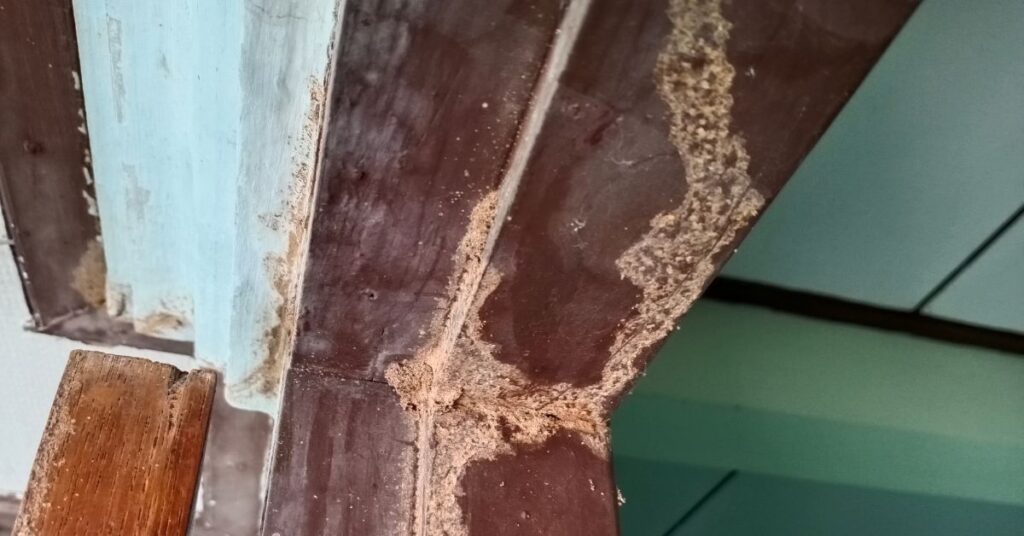8 Things That Attract Termites To Your Home

A home is a significant investment for most people. Protecting this investment becomes paramount, especially from hidden threats like termite damage. Termites can silently erode the integrity of your home and lead to costly repairs and structural issues. Understanding what attracts these destructive pests to your home is crucial. In this article, we’ll explore the factors that make your home appealing to termites and provide insights on safeguarding your cherished investment from their damaging effects.
1 – Moisture and Humidity
Termites are attracted to moisture and areas with high humidity. Leaky pipes, poor drainage, and improper ventilation create damp conditions ideal for termites. Excess moisture softens the wood, making it easier for termites to feed and build colonies. Regularly checking for and repairing leaks, ensuring proper ventilation, and using dehumidifiers can help reduce the risk of a termite infestation.
2 – Wood in Contact with Soil
Wood in direct contact with the ground is a prime target for termites. This includes wooden structures like porch steps, deck posts, and door frames. Soil-to-wood contact provides termites with easy access to food and moisture. To prevent this, a barrier between wood and soil must be maintained, and treated wood should be used for outdoor construction.
3 – Dead Wood and Tree Stumps
Piles of firewood, dead trees, and old stumps near your home can attract termites. These sources of decaying wood are ideal feeding grounds for termites, and once they finish, they might move to your home. Keeping firewood stored away from your house and removing dead trees and stumps can minimize this risk.
4 – Clogged Gutters and Poor Drainage
Clogged gutters can accumulate water and damage, creating a moist environment that termites find attractive. When gutters are obstructed, water spills over and saturates the soil around your home’s foundation, increasing the risk of termites. Additionally, poor drainage can exacerbate these moist conditions. Regularly cleaning and maintaining gutters, downspouts, and drainage systems is essential to prevent water accumulation and deter termites. Ensuring that water is directed away from the home’s foundation through proper gutter and downspout placement can significantly reduce the likelihood of termites being attracted to your home.
5 – Mulch and Garden Materials
While beneficial for gardens, mulch can attract termites due to its moisture-retaining properties and cellulose content. Using less cellulose-rich mulch like pine needle mulch or placing mulch at least 15 inches away from the foundation can help reduce the likelihood of attracting termites.
6 – Cracks and Openings in the Foundation
Termites can enter a home through tiny cracks and openings in the foundation. Even the most minor cracks can provide access to these pests. Regular inspections and sealing of cracks or crevices in the foundation walls and around utility lines and pipes can prevent termites from entering.
7 – Poor Air Circulation and Ventilation
Areas with poor ventilation, such as crawl spaces, attics, and basements, can accumulate moisture, creating an attractive environment for termites. Ensuring these areas are well-ventilated and dry is crucial in deterring termites.
8 – Excess Plant Cover and Dense Vegetation
Overgrown vegetation and dense plant cover around the house can create damp, shaded areas that termites find appealing. Trimming plants and trees to ensure they do not touch your home and maintaining a well-kept yard can reduce termite attraction.
Schedule Termite Control Service With 707 Pest Solutions
Protecting your home from termites is crucial, and 707 Pest Solutions offers thorough termite inspections to safeguard your most significant investment. Our team of licensed professionals conducts comprehensive checks to identify any signs of infestation, providing tailored solutions to eliminate and prevent termites. Don’t wait for costly damage; schedule your inspection with us and ensure your home remains safe and termite-free. Contact 707 Pest Solutions today for expert assistance and peace of mind.
